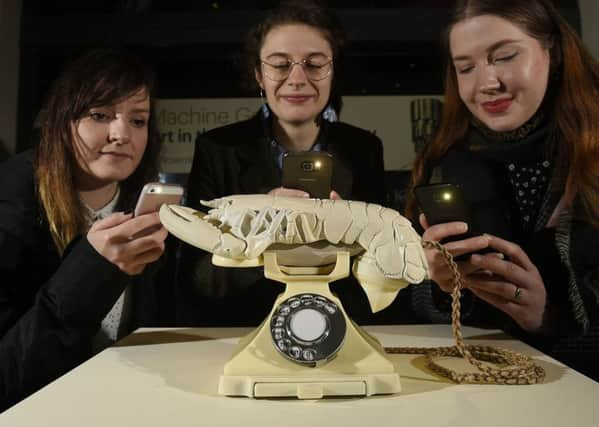Salvador Dali's '˜lobster phone' secured for Scotland's national collection


The National Galleries of Scotland has unveiled one of the world’s most iconic works of “Surrealist” art at its new home in Edinburgh after stepping in to prevent the 80-year-old sculpture being snapped up by an overseas institution.
The Lobster Telephone was one of 11 similar sculptures made for the East Lothian-born poet and art collector Edward James. He became close friends with Dali and a major patron of the Spanish artist after the pair met in 1934. All the sculptures were made to fit on real telephones.
Advertisement
Hide AdAdvertisement
Hide AdThe white sculpture has been bought using part of a trust fund set up to help pay for major new acquisitions for the Scottish National Gallery of Modern. It was instigated by the leading Edinburgh psychiatrist Henry Walton, who bequeathed several million pounds and a huge art collection after he died in 2012.
The National Galleries already has Surrealist work by René Magritte, Joan Miró, Salvador Dalí, Paul Delvaux, Toyen, Yves Tanguy, Max Ernst, Leonora Carrington and Alberto Giacometti, as well as Dali, in its collection.
Of the 11 Lobster Telephones commissioned by James, who inherited the vast West Dean Estate in Sussex when he was just 25, seven were painted white and four red. Others are held in collections in Australia, Portugal, the Netherlands, Germany, South Africa and the United States.
The export bar on the Lobster Telephone unveiled by the National Galleries, the last known example of the sculpture in existence in the UK, was announced by arts minister Michael Ellis in March.
Advertisement
Hide AdAdvertisement
Hide AdAt the time, he said: “Salvador Dali was one of the greatest artists of the 20th Century. It is important that we keep world-class art in this country and I hope a buyer can be found to save it for the nation.”
Simon Groom, director of modern and contemporary art at the National Galleries, said: “This major acquisition cements our position as one of the world’s greatest collections of Surrealist art.
“Object sculptures – where the artist takes an existing, manufactured object and transforms it with a slight addition or alteration – were popular among the Surrealists, but are now incredibly rare. They turned convention upside-down, saying that anything could be art, and that art and life were not separate.
“Dalí created something incredibly rich, imaginative and funny with the most economical of means. Before this, we had nothing of this kind.”